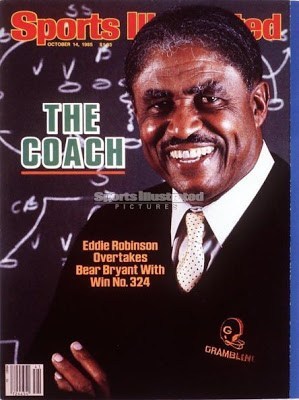|
Edward Gay Robinson was born in Jackson, Louisiana in 1919 to a father who was a sharecropper and a mother who was a domestic worker. At the age of six Robinson’s family moved to Baton Rouge, Louisiana where Robinson would be introduced to the game of football. He would become intrigued by the head football coach of the local high school team who visited his elementary school class. This was the beginning of a journey that would change his life and the lives of others. As a high school student Robinson was known for organizing football games for the local children in his neighborhood; at the same time he was a standout player on the McKinley High School football team. He graduated from McKinley in 1937, then attend Leland College in Baker, Louisiana on a football scholarship where he would play as an elite quarterback for the team. Robinson would develop a friendship with a minister named Ruben turner who taught Robinson the importance of learning and developing his team’s playbook, as well as taking Robinson to his first coaching clinic. He would graduate from Leland College and began looking for a coaching job but did not find any luck. Because of the Jim Crow laws he could only get a coaching job at an HBCU, but all of the head coaching jobs we filled. Robinson began working at a feed mill for twenty-five cents an hour but his luck would soon change. The Louisiana Negro Normal and Industrial Institute was searching for a new head coach, Robinson applied for the job and became the head coach of what is now known as Grambling State University, in 1941. At the age of twenty-two Robinson would begin his legendary coaching journey without the help of any assistant coaches to relieve him of some of the duties. Coach Robinson was determined to create a culture of hard work and success despite his obvious challenges, he did everything from coaching the team, mowing the lawn they played on, and he even wrote the teams press releases for the local media. Robinson’s first season as the head coach of Grambling State the football team only won three games. The following season Robinson completely turned around the football program, his team went from a three win team to an undefeated nine win team, who did not allow an opposing touchdown. Because of World War II the Grambling football team didn’t take the field for two years because his players were being recruited for the war. The team returned to the field in 1945 and posted a ten win season, this was a vivid picture of the future of Grambling State football. Under the direction of Eddie Robinson Grambling State University’s football team saw 45 winning season and 19 South Western Athletic Conference championships in fifty-five seasons. He was instrumental in helping 200 of his players reach the professional football ranks; he was also the college football coach of Doug Williams the first black quarterback to win the Super Bowl. A trailblazer in the world of football Robinson became the first college football head coach to reach the four hundred win mark; he ended his career with a 408-167-16 record as a head coach. In 1998 the Los Angeles Football Classic Foundation named their black college football national championship trophy after Eddie Robinson. In 1992 Eddie Robinson was named the Bobby Dodd coach of the year. In 1994 the black college football national player of the year award was renamed the Eddie Robinson award. In 1997 the Football Writers Association of America renamed their national coaching award after Robinson. Between the years of 1995 and 1997 Robinson posted 3 losing seasons and retired under the scrutiny of being forced out by the University. Robinson retired from coaching football at the age of 78 but left a legacy even the most celebrated white football coaches were forced to respect. April 3rd, 2007 Coach Eddie Robinson passed away, but the seeds of the greatness he planted continue to harvest to this day. Robinson raised the standards of coaching and football expectations for black college football. Despite all of the obstacles in front of Robinson he pushed through to claim his spot at the top of the college football coaching mountain. Coach Edward Robinson, we proudly stand on your shoulders. J.A. Ward References:
http://www.encyclopedia.com/topic/Eddie_G._Robinson.aspx https://en.wikipedia.org/wiki/Eddie_Robinson_(American_football_coach)
0 Comments
Leave a Reply. |
Details
Categories
All
Click Here to join our mailing list
|
Contact Us: |
Connect With Us |
Site powered by PIT Web Design


 RSS Feed
RSS Feed



